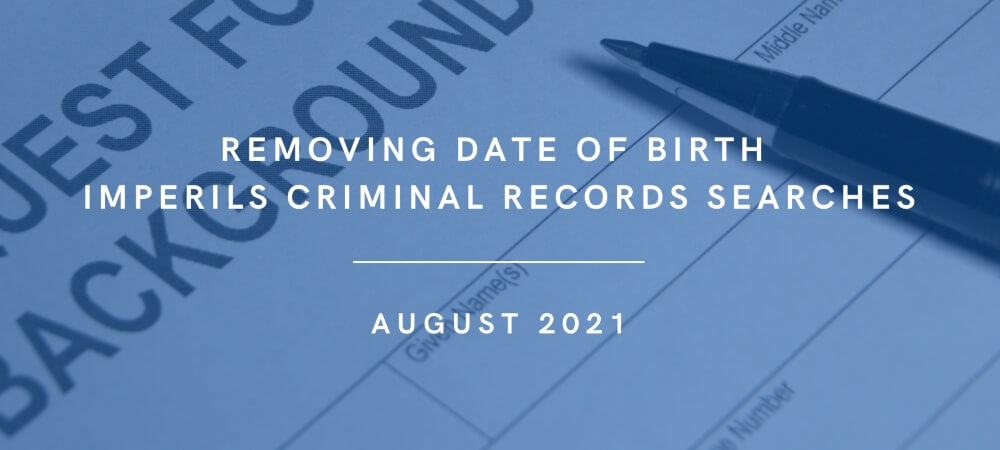REMOVING DATE OF BIRTH IMPERILS CRIMINAL RECORDS SEARCHES
Did you know that certain states and counties are considering removing or redacting dates of birth (DOB) from public court records, which will make it nearly impossible to verify an individual’s criminal history? This is because criminal records typically have no social security numbers (SSN) attached to them. Without a date of birth as an additional identifier, it becomes extremely problematic to verify whether a particular criminal record, with a name match only, is your applicant’s. This is placing companies and organizations at significantly greater risk.
In Michigan, for example, a 2019 decision by the State Supreme Court ruled that Personally Identifiable Information (PII) such as dates of birth and drivers’ license numbers will no longer be visible to the public via online court records. Although the state’s original 2020 rollout date was postponed, the new ruling is set to go into effect January 1, 2022. The ruling allowed counties to perform this function, but most counties seemed to refuse to take on this additional responsibility due to staffing and budget constraints.
In California, the State Court of Appeal recently ruled that DOB and/or drivers’ license numbers cannot be used to identify individuals in electronic searches of a court’s criminal records. Most California counties have these electronic terminals – which are different than just their websites available to anyone. These terminals have made it possible to expedite the processing of county criminal records searches, which is crucial for any business or organization needing to perform criminal background checks to safeguard their employees, customers, and their organization.
This California ruling requires court researchers to obtain verification of DOB and other Personally Identifiable Information (PII) directly from the county court office. However, some counties are refusing to provide this service, or will only do it for additional fees and within an undetermined lengthy turnaround time, based upon “when they have the time,” making this process unreliable at best.
Impact of Removing D.O.B. on Private Business
These changes will particularly impact businesses that are required to conduct pre-employment background checks and, without these distinguishing pieces of information, it will be difficult to access reliable background screening information on candidates.
During a background check, an individual’s date of birth is always confirmed to ensure the correct person is being screened. Removing the date of birth and other key identifiers from public records will significantly impact the accuracy and cost of obtaining background checks as well as the ease and timeliness of retaining a thorough, best practices background screening report. Doing so will also result in valuable information being withheld from key hiring decision-makers and enable those with checkered pasts to more easily secure positions in other states. Perhaps, even worse, applicants and employees will be far more likely to be misidentified or have another individual’s criminal history appear on their background check report.
With privacy concerns on the rise, many state and county legislators believe they are helping the public, when in fact they are creating a dangerous environment for all. There is a difference between county court electronic access terminals, for which access can be regulated, versus the county’s website where anyone with internet access can search the web worldwide.
Consumer Reporting Agencies (CRAs) follow the Fair Credit Reporting Act (FCRA). That means CRAs perform background checks only with:
· Consumer Consent, and with a
· Permissible Business Purpose.
Permissible business purposes include, but are not limited to:
· Tenant and Resident Screening
· Country Club Membership Screening
States and counties need to recognize this distinction, i.e., the consumer is consenting and authorizing a background check on themself for some permissible purpose – such as wanting to get hired for a job or to rent an apartment home. Politicians need to understand the difference between open access to all, and access with permission. CRAs and the individuals they employ certify to follow the law. There should be a way to provide authorized access to these electronic terminals for these companies and individuals.
The public and the business community needs to let their legislators know this trend of removing or redacting DOBs must be reversed. A solution would be to require court researchers to register with the counties, and only providing electronic court terminal access to vetted individuals, who certify to comply with the FCRA. If this does not happen, companies and organizations will find that criminal background checks are either impossible to complete, or will be delayed excessively, making it not feasible to properly vet candidates, which will place everyone at greater peril.
Posted by: Rudy Troisi, L.P.I., President and CEO, Reliable Background Screening
Copyright © 2021, Reliable Background Screening, a Division of Marcett, Inc. All rights reserved.


